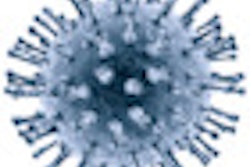The National Institute of Allergy and Infectious Diseases, part of the National Institutes of Health (NIH), has awarded a five-year, $3.2 million grant to the New York University (NYU) College of Dentistry and the University of Medicine and Dentistry of New Jersey (UMDNJ) to conduct the first study to evaluate whether gp340, a protein found in saliva and other mucosal secretions, can prevent HIV transmission in vivo.
The study is being led by Daniel Malamud, PhD, a professor of basic science and craniofacial biology and director of the HIV/AIDS Research Program at the NYU College of Dentistry, and Min Lu, PhD, a professor of microbiology and molecular genetics at the Public Health Research Institute Center and the UMDNJ-New Jersey Medical School.
Malamud will generate the gp340 molecules and smaller fragments of the molecule for laboratory analysis, and Lu will analyze the biophysical interactions of these proteins with HIV.
Malamud's research on the antiviral activity of gp340 and other human salivary proteins has been funded by the NIH for more than 25 years. Although it has been established that salivary proteins can protect against HIV, the mechanisms by which the proteins offer protection are not fully understood.
In previous studies, gp340 was shown to inhibit HIV transmission. Malamud and Lu will evaluate gp340 antiviral activity in immune deficient mice that have had their immune systems reconstituted with human immune cells.
The researchers will inject the mice's salivary glands with a vector carrying a gene that produces the portion of gp340 that has been identified as inhibiting HIV infection. Once the mice have secreted the gp340 fragments in their saliva, the investigators will inject HIV into the oral cavity. They will compare these mice with a second group of mice that have been injected with HIV but not gp340 to determine whether gp340 protected the first group from infection.
The study will also analyze the impact of gp340 on HIV transmission in the mouse female reproductive tract. Previous in vitro research has suggested that gp340 on the surface of cells in the reproductive tract may enhance HIV infection by binding HIV to vaginal cells. The researchers plan to assess whether introducing soluble gp340 into the female reproductive tract would override the binding of surface cells to HIV and reduce HIV infection.
Findings from the study could help in the development of new antiviral drugs to protect against HIV, the researchers noted.



















